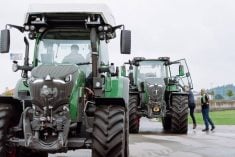A U.S. government study that shows insecticidal seed treatments have no effect on soybean yields in South Dakota runs contrary to other research, says a Syngenta spokesperson.
Palle Pedersen, Syngenta technical manager for development of seed treatments for corn and soybeans, said field trials on seed treatments have proven that the product does increase soybean yields.
“Looking at those other universities from the upper Midwest, you can look at my old data from Iowa State, (data) from the University of Wisconsin, the University of Illinois … they show the same thing. They show the advantage of the insecticide,” said Pedersen, who was a soybean agronomist at Iowa State before he joined Syngenta.
Read Also

Canadian Food Inspection Agency slammed for handling of bovine tuberculosis case
The federal government leans heavily on producers to “take one for the team” and risk their livelihoods without any reassurance of support.
For example, Pedersen conducted a study for the Iowa soybean checkoff program in 2005.
“We saw a 2.8 bushel (per acre) yield advantage … for fungicide and insecticide (seed treatment), compared to not treated at all.”
He also referred to field trials conducted in 2010 by Direct Enterprises Inc., an Indiana seed treatment and inoculant distributor.
Based on data from 11 states in the U.S. Midwest, Direct Enterprises found that a combination of fungicidal and insecticidal seed treatments on soybeans yielded two to six bushels more per acre than fields with untreated seeds.
Ted Labun, technical manager for Syngenta Seedcare in Canada, said soybeans treated with insecticide are also yielding more north of the border.
“We’ve had three years of experience with commercial growers using CruiserMaxx beans and we’re seeing anywhere from a two to four bu. advantage (over untreated seed).”
Pedersen also disagreed with U.S. Department of Agriculture entomologist Jonathan Lundgren’s conclusion that insecticidal seed treatments kill predator insects that feed on soybean aphids.
Pedersen said there’s no scientific evidence to back up that conclusion.
“I’ve never seen any scientific evidence that beneficials, like ladybugs and these things that are common predators of soybean aphids, that they are harmed by any neonicotinoid insecticides,” he said.
Labun estimated 30 percent of soybean acres in Canada have seed treated with insecticide and fungicide. Almost no soybean acres had treated seed five years ago, he added.
The cost of fungicidal and insecticidal seed treatment is approximately $14 per acre, Labun said.
Bayer, the manufacturer of the other insecticide in Lundgren’s study, did not respond to interview requests.















